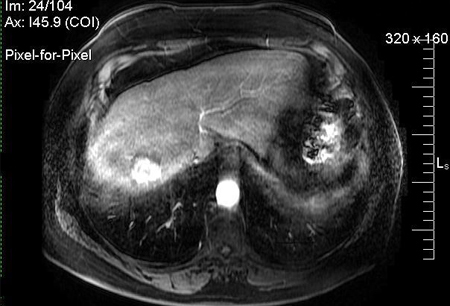Summary
Definition
History and exam
Key diagnostic factors
- history of cirrhosis
- history of chronic hepatitis B (HBV) or C (HCV)
- history of chronic heavy alcohol use
- history of diabetes or obesity
- family history of liver cancer
- older age
- hepatomegaly
Other diagnostic factors
- abdominal distension
- esophageal or gastric variceal bleeding
- right upper quadrant abdominal pain
- early satiety
- weight loss
- lower extremity edema
- hepatic encephalopathy
- cachexia
- jaundice
- splenomegaly
- asterixis
- spider nevi
- palmar erythema
- periumbilical collateral veins
- fetor hepaticus
- diarrhea
- paraneoplastic syndrome
- bone pain
- severe abdominal pain
- obstructive jaundice
- enlarged hemorrhoidal veins
- vascular bruit
Risk factors
- cirrhosis
- chronic hepatitis B (HBV) infection
- chronic hepatitis C (HCV) infection
- chronic heavy alcohol use
- diabetes
- obesity
- family history of liver cancer
- aflatoxin exposure
- thorium dioxide radioactive contrast exposure
- hemochromatosis
- cigarette smoking
- alpha-1-antitrypsin deficiency
- porphyria cutanea tarda
- primary biliary cholangitis (PBC)
- primary sclerosing cholangitis (PSC)
- use of androgenic steroids
- use of oral contraceptives
- male sex
Diagnostic tests
1st tests to order
- ultrasound of liver
- CBC
- basic metabolic panel
- liver function tests
- prothrombin time/INR
- viral hepatitis panel
- alpha fetoprotein (AFP)
Tests to consider
- contrast CT scan of abdomen
- contrast MRI of abdomen
- liver biopsy
- CT scan of chest
- bone scan
Treatment algorithm
Barcelona Clinic Liver Cancer (BCLC) stage 0-A (very early 0 or early disease A): possible surgical candidate (good liver function)
BCLC stage 0-A (very early 0 or early disease A): nonhepatic resection candidate
BCLC stage B: intermediate disease
BCLC stage C: advanced disease
BCLC stage D: end-stage disease
recurrence
Contributors
Authors
Doan Y Dao, MD
Assistant Professor of Medicine
Director, Center of Excellence for Liver Disease in Vietnam
Johns Hopkins School of Medicine
Department of Medicine
Division of GI & Hepatology
Baltimore
MD
Disclosures
DYD has received grant support from Roche Diagnostic International Ltd., Fujifilm Medical Systems, and DELFI Diagnostics LLC.
Ngoc Thai Truong, MD, MS
Research Assistant
Vietnam Viral Hepatitis Alliance
Reston
VA
Disclosures
NTT declares that he has no competing interests.
Acknowledgements
Dr Doan Y Dao and Dr Ngoc Thai Truong would like to gratefully acknowledge Dr Qingyao Daniel Huang, Dr Margaret Li Peng Teng, Dr Poh Seng Tan, Dr Badar Muneer, and Dr Smruti R. Mohanty, previous contributors to this topic.
Disclosures
QDH declares that he has no competing interests. MLPT declares that she has no competing interests. PST has received sponsorship/honorarium from Bayer (South East Asia) Pte Ltd and Sirtex for attending conferences, delivering lectures, and participating in advisory board meetings. BM declares that he has no competing interests. SRM serves as a speaker for Bristol-Myers Squibb regarding the use of entecavir for the treatment of chronic hepatitis B.
Peer reviewers
Srikrishna Nagri, MD
Gastroenterologist
Dartmouth-Hitchcock Nashua
Nashua
NH
Disclosures
SN declares that he has no competing interests.
Ned Snyder, MD, FACP
Professor of Medicine
Chief of Clinical Gastroenterology and Hepatology
University of Texas Medical Branch
Galveston
TX
Disclosures
NS declares that he has no competing interests.
Peer reviewer acknowledgements
BMJ Best Practice topics are updated on a rolling basis in line with developments in evidence and guidance. The peer reviewers listed here have reviewed the content at least once during the history of the topic.
Disclosures
Peer reviewer affiliations and disclosures pertain to the time of the review.
References
Key articles
National Comprehensive Cancer Network. NCCN clinical practice guidelines in oncology: hepatocellular carcinoma [internet publication].Full text
Singal AG, Llovet JM, Yarchoan M, et al. AASLD practice guidance on prevention, diagnosis, and treatment of hepatocellular carcinoma. Hepatology. 2023 Dec 1;78(6):1922-65.Full text
Vogel A, Chan SL, Dawson LA, et al. Hepatocellular carcinoma: ESMO clinical practice guideline for diagnosis, treatment and follow-up. Ann Oncol. 2025 May;36(5):491-506.Full text
European Association for the Study of the Liver. EASL clinical practice guidelines on the management of hepatocellular carcinoma. J Hepatol. 2025 Feb;82(2):315-74.Full text Abstract
Su GL, Altayar O, O'Shea R, et al. AGA clinical practice guideline on systemic therapy for hepatocellular carcinoma. Gastroenterology. 2022 Mar;162(3):920-34.Full text Abstract
Gordan JD, Kennedy EB, Abou-Alfa GK, et al. Systemic therapy for advanced hepatocellular carcinoma: ASCO guideline update. J Clin Oncol. 2024 May 20;42(15):1830-50.Full text Abstract
Reference articles
A full list of sources referenced in this topic is available to users with access to all of BMJ Best Practice.

Differentials
- Cholangiocarcinoma
- Hepatic adenoma
- Hemangioma of liver
More DifferentialsGuidelines
- NCCN clinical practice guidelines in oncology: management of immune checkpoint inhibitor-related toxicities
- Critical update: AASLD practice guidance on prevention, diagnosis, and treatment of hepatocellular carcinoma
More GuidelinesCalculators
Child Pugh classification for severity of liver disease
MELD Score for End-Stage Liver Disease (NOT appropriate for patients under the age of 12)
More CalculatorsLog in or subscribe to access all of BMJ Best Practice
Use of this content is subject to our disclaimer